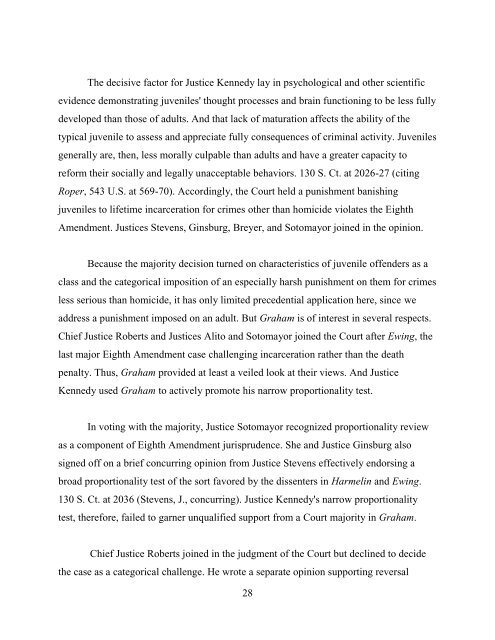State v. Proctor - Kansas Judicial Branch
State v. Proctor - Kansas Judicial Branch
State v. Proctor - Kansas Judicial Branch
You also want an ePaper? Increase the reach of your titles
YUMPU automatically turns print PDFs into web optimized ePapers that Google loves.
The decisive factor for Justice Kennedy lay in psychological and other scientific<br />
evidence demonstrating juveniles' thought processes and brain functioning to be less fully<br />
developed than those of adults. And that lack of maturation affects the ability of the<br />
typical juvenile to assess and appreciate fully consequences of criminal activity. Juveniles<br />
generally are, then, less morally culpable than adults and have a greater capacity to<br />
reform their socially and legally unacceptable behaviors. 130 S. Ct. at 2026-27 (citing<br />
Roper, 543 U.S. at 569-70). Accordingly, the Court held a punishment banishing<br />
juveniles to lifetime incarceration for crimes other than homicide violates the Eighth<br />
Amendment. Justices Stevens, Ginsburg, Breyer, and Sotomayor joined in the opinion.<br />
Because the majority decision turned on characteristics of juvenile offenders as a<br />
class and the categorical imposition of an especially harsh punishment on them for crimes<br />
less serious than homicide, it has only limited precedential application here, since we<br />
address a punishment imposed on an adult. But Graham is of interest in several respects.<br />
Chief Justice Roberts and Justices Alito and Sotomayor joined the Court after Ewing, the<br />
last major Eighth Amendment case challenging incarceration rather than the death<br />
penalty. Thus, Graham provided at least a veiled look at their views. And Justice<br />
Kennedy used Graham to actively promote his narrow proportionality test.<br />
In voting with the majority, Justice Sotomayor recognized proportionality review<br />
as a component of Eighth Amendment jurisprudence. She and Justice Ginsburg also<br />
signed off on a brief concurring opinion from Justice Stevens effectively endorsing a<br />
broad proportionality test of the sort favored by the dissenters in Harmelin and Ewing.<br />
130 S. Ct. at 2036 (Stevens, J., concurring). Justice Kennedy's narrow proportionality<br />
test, therefore, failed to garner unqualified support from a Court majority in Graham.<br />
Chief Justice Roberts joined in the judgment of the Court but declined to decide<br />
the case as a categorical challenge. He wrote a separate opinion supporting reversal<br />
28

















